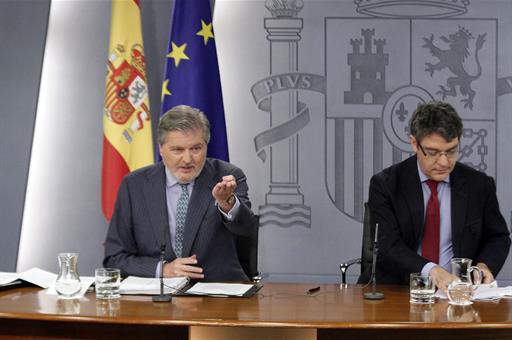Council of Ministers
Government approves measures to push on with energy transition
Council of Ministers - 2017.6.16
Moncloa Palace, Madrid
The Minister for Energy, Tourism and Digital Agenda, Álvaro Nadal, stressed that the government's intention is to push on with the energy transition, a process to transform the current energy system, which emits carbon dioxide, to another that is "increasingly cleaner and more reliant on renewable energy", whilst also ensuring lower prices for consumers.
The minister claimed that the energy transition policy needs to be implemented "gradually, in line with technological progress" to help benefit the planet and meet European and international environmental targets.
The minister recalled that the government has committed to ensuring that 20% of energy consumed in Spain by the year 2020 will come from renewable sources, a more ambitious target than that imposed by other European countries. Álvaro Nadal explained that, according to the official data for 2015, market penetration of renewable energies stood at 17.3% and that, thanks to the measures being taken, our country is in a position to meet the target set "without any major problems".
New auction of renewables
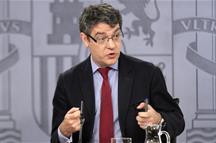 Pool Moncloa/J.M. CuadradoÁlvaro Nadal reported that the Council of Minister approved the call for a renewable energy auction, which will allow Spain to make significant progress towards the targets set for 2020. At the last auction, held in May, the applications made exceeded the power awarded threefold and the successful bidders offered the maximum discount possible, which means that renewable energy projects will be carried out without the need for additional premiums to the revenue obtained from the market, in other words, at zero-cost for electricity consumers.
Pool Moncloa/J.M. CuadradoÁlvaro Nadal reported that the Council of Minister approved the call for a renewable energy auction, which will allow Spain to make significant progress towards the targets set for 2020. At the last auction, held in May, the applications made exceeded the power awarded threefold and the successful bidders offered the maximum discount possible, which means that renewable energy projects will be carried out without the need for additional premiums to the revenue obtained from the market, in other words, at zero-cost for electricity consumers.
The minister explained that, since "the result of the auction was extraordinarily good", and the demand very high, the government feels it is opportune to approve another auction as soon as possible. "3,000 megawatts were auctioned off and demand hit almost 10,000 MW at the minimum price. We received more than two and a half times the demand than the power finally allocated".
A total of 3,000 additional megawatts of wind and photovoltaic power will be auctioned under the new call. Facilities can take part on a competitive basis, such that the most efficient facilities in terms of cost will be the successful bidders. According to the minister, renewable energy "has now come of age and is able to compete on equal terms with other energy sources in the system".
Subsidies for energy efficiency
The government regulated the direct granting of subsidies, for a total sum of 336 million euros, to one-off local entity projects in municipalities with less than 20,000 inhabitants that reduce carbon dioxide emissions and foster the change to a low carbon economy.
The Minister for Energy underlined that "this is the largest round of subsidies for energy efficiency" carried out in Spain for local authorities with this population, some 7,700.
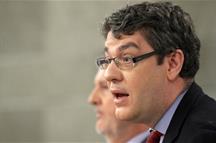 Pool Moncloa/J.M. CuadradoThe measure, he highlighted, seeks to "particularly help the smallest local authorities, which always have the greatest difficulties receiving financing and in managing their affairs". Moreover, the projects will contribute to halting rural depopulation and to improving the territorial structure of the country.
Pool Moncloa/J.M. CuadradoThe measure, he highlighted, seeks to "particularly help the smallest local authorities, which always have the greatest difficulties receiving financing and in managing their affairs". Moreover, the projects will contribute to halting rural depopulation and to improving the territorial structure of the country.
Álvaro Nadal specified that the projects to be financed relate to energy efficiency, the use of renewable energies as a source of electricity and thermal use in public buildings and infrastructures. This initiative is in addition to the measures already pushed through by the National Fund for Energy Efficiency, which has mobilised more than 508 million euros, which according to the minister, clearly demonstrates the effort in this field, as a public policy, resulting in the greatest effort this country has ever made".
Alternative energy powered vehicles
The government agreed to allocate 14.26 million euros for the acquisition of vehicles powered by alternative energies to petrol and diesel and for the implementation of recharge points for electric vehicles for public use (2017 Movea Plan). The programme will come into force following publication in the Official State Gazette and will end on 15 October 2017 or when the available funds are used up.
Álvaro Nadal specified that this plan helps promote the purchase of electric vehicles, and vehicles powered by liquefied petroleum gas, compressed or liquefied natural gas and those powered by hydrogen fuel cells, as well as electric motorcycles.
The amount of the subsidies is set with different scales according to the type of vehicle and fuel used. The minister pointed out that this will amount to 500 euros for cars and vans, 5,000 euros for mini-buses and mini-vans and 18,000 euros for buses and lorries. Subsidies will range between 1,500 and 2,000 euros for motorbikes.
The minister concluded by pointing out that all these measures to boost the energy transition approved on Friday will result in "a great deal more renewable energy and will clearly guarantee full compliance with the 2020 targets".
Office for the Recovery and Management of Assets
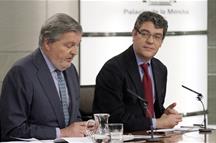 Pool Moncloa/J.M. CuadradoThe Council of Ministers reviewed the first Annual Report of the Activity of the Office for the Recovery and Management of Assets (Spanish acronym: ORGA) set up by the government in October 2015 to locate and manage assets seized in the fight against corruption and organised crime, something which each judicial body had carried out previously.
Pool Moncloa/J.M. CuadradoThe Council of Ministers reviewed the first Annual Report of the Activity of the Office for the Recovery and Management of Assets (Spanish acronym: ORGA) set up by the government in October 2015 to locate and manage assets seized in the fight against corruption and organised crime, something which each judicial body had carried out previously.
In its first year of operation, the office paid 12.7 million euros into the deposit and consignment account, mostly from cash seized, from the sale of certain goods, as well as the destruction or scrapping of goods.
The Minister for Education, Culture and Sport and Government Spokesperson, Íñigo Méndez de Vigo, highlighted that, since the creation of ORGA, the management of assets seized from corruption and organised crime has become "more efficient", and has helped relieve the courts of this task.
Balance of the week
Íñigo Méndez de Vigo highlighted, at the start of his political balance of the week, that the debate on the motion of no confidence presented by 36 MPs from Unidos Podemos-En Comú Podem-En Marea "had no political grounding, but was based on universalist generalisations and a deformation of the reality".
The minister underlined that the candidate, Pablo Iglesias, "lacked the backing of an alternative parliamentary majority" and of "a realistic, rigorous, viable and responsible programme". In his opinion, Pablo Iglesias "failed the exam that he himself had set, receiving no political backing whatsoever except from his own parliamentary group, ERC and Bildu-Batasuna".
The conclusion the government has reached, according to the Government Spokesperson, is that "the model of political cooperation based on realism and responsibility has come out on top", and "instability, insecurity, mistrust and uncertainty" have lost. Furthermore, those that "maintain a realistic vision of the problems and their solutions and an optimistic view of our country" have also come out on top.
Íñigo Méndez de Vigo also pointed out that those that deny the Transition and "do not accept that in 40 years of democracy Spain has consolidated an effective political and institutional system" have also lost.
Positive economic path
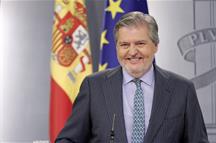 Pool Moncloa/J.M. CuadradoThe Government Spokesperson underlined that political certainty and economic reforms have led Spain to this "positive economic path". The economy, he said, has been growing at 3% for almost four years, it doubles the eurozone average and "it places us in a leadership position". He also highlighted that in the first five months of this year, there are "almost half a million more National Insurance contributors than at the end of 2016".
Pool Moncloa/J.M. CuadradoThe Government Spokesperson underlined that political certainty and economic reforms have led Spain to this "positive economic path". The economy, he said, has been growing at 3% for almost four years, it doubles the eurozone average and "it places us in a leadership position". He also highlighted that in the first five months of this year, there are "almost half a million more National Insurance contributors than at the end of 2016".
Íñigo Méndez de Vigo recalled that the Bank of Spain raised its growth forecast by three tenths, to stand at 3.1% of the Gross Domestic Product (GDP) and that the Foundation for Economic Analysis of Savings Banks (Spanish acronym: FUNCAS) has raised it to 3.2% of GDP.
These numbers, argued the minister, translate into "real and clear improvements for our citizens". The number of households with all their members out of work has dropped by one third, as have the numbers of long-term unemployed. The number of young job seekers has fallen by 40% and the number of women contributing to the Social Security system is at a record high.
Constructive dialogue
According to Íñigo Méndez de Vigo, "the government has shown that it is fully willing to enter into constructive dialogue and is capable of forging pacts". In this regard, he recalled that a pact was made on the electricity discount for the most vulnerable users, on the rise in the minimum wage, on the ceiling on spending and on the decree on stevedores, and the General State Budget was approved with the support of seven parliamentary groups.
As regards the international agenda of the President of the Government, the minister announced that Mariano Rajoy will travel to Brussels on 22 and 23 June to attend the meeting of the European Council. On 29 June, he will attend the preparatory summit of the G-20 in Germany, and on 30 June will attend a bilateral summit in Poland.
Current affairs
 Pool Moncloa/J.M. Cuadrado
Pool Moncloa/J.M. Cuadrado
In light of the arrest, for new offences of sexual assault, of a former inmate for similar offences, who was released in 2013 as a result of the annulment of the so-called Parot Doctrine, the minister and Government Spokesperson explained that the European Court of Human Rights in Strasbourg annulled this doctrine because it considered that it did not adhere to the European Convention on Human Rights. In order to minimise the negative impact of this decision, the government introduced the legal figure of imprisonment without parole in the reform of the Criminal Code in 2015, which is now in force, but which cannot be applied retroactively.
The social alarm generated by cases like this, added the minister, "is worthy of serious and profound reflection", by those that seek to remove the concept of imprisonment without parole in their election manifesto.
When asked about the state of the passage of the General State Budget for 2018, Íñigo Méndez de Vigo said that the government, and in particular, the Minister for the Treasury and Public Function, are aware "that time is pressing", and are in contact with all the parliamentary groups in order to present the public accounts in
October and thus meet its commitments with the European Union.
As regards the initiative of the President of the Regional Government of Catalonia to create a list of "electoral agents" to collaborate as volunteers in the organisation of the pro-independence referendum, Íñigo Méndez de Vigo stressed that this is "once again a case of an announcement of another announcement", which shows the "clear impotence of the regional government of Carles Puigdemont", which lacks "any type of seriousness", and confirms that public servants, which have the backing of the government, are not going to take part in organising an unlawful referendum.
As regards the reform of the financing of the autonomous regions, the Government Spokesperson referred to the agreement, taken at the Conference of Regional Presidents back in January, to set up groups of experts to draft an opinion on this issue. The government will study this report with the "intention of talking and reaching an agreement that characterises this legislature, concluded Íñigo Méndez de Vigo.
The Minister for Energy, Tourism and Digital Agenda, when asked about the closure of coal power stations, said that the decision does not exclusively depend on business decisions, but rather that it is necessary to previously define the "energy mix we want", taking into account factors of energy efficiency, environmental goals, needs, prices, etc. and "then aligning business approaches in an orderly fashion".
In relation to the controversy deriving from the measures to be adopted in schools and other public centres in response to heat waves such as the one being experienced at present, Álvaro Nadal advocated insulation - which provides protection from both heat and cold - as a measure to improve energy efficiency. "It is important to make plans in this regard", he stressed.





